Verhoog: Pieter Hugo Gerardus
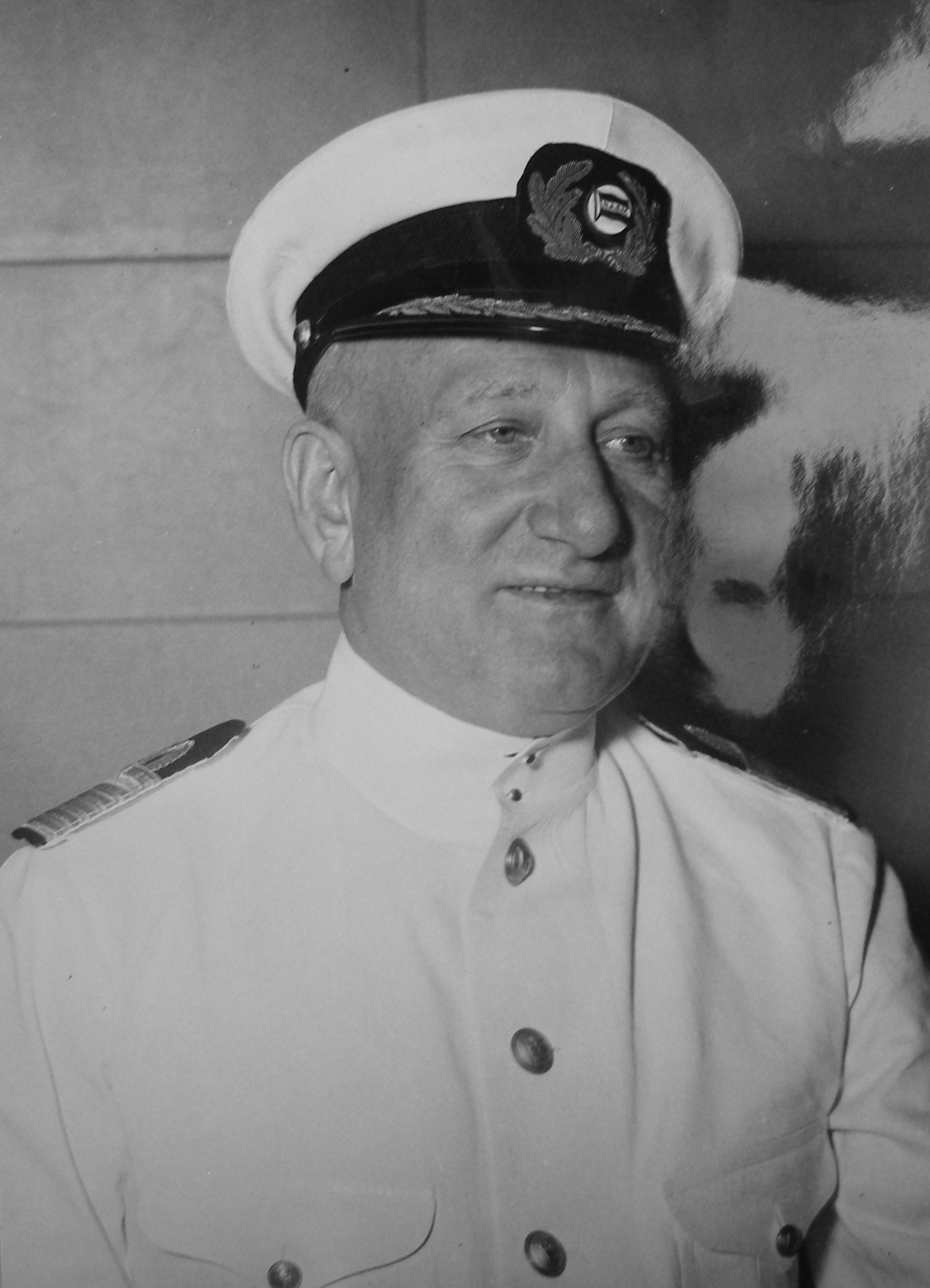
This photo was taken when he was promoted to Commodore in 1951. Note the full gold bar braid on his shoulder board
Full name: Verhoog: Pieter Hugo Gerardus
Born: 11 January 1893 at Amsterdam
Joined the Holland America Line as Cadet on 08 August. 1910
Studied at the Kweekschool voor de Zeevaart in Amsterdam, date of take in was 26 Augsut 1907. and finished his year as nbr. 11 of the A side (24 cadets) with an average of 7. (Out of a range of 10) (b)
His father was Gijsbertus Verhoog (21 Jul 1862 Naaldwijk ZH – 15 Aug. 1928 Noordwijk ZH) and his mother Aleida Hoogendam (17 Oct. 1865 Noordwijk ZH – ?? –Oct. 1946)
He did not directly come from a seafaring tradition has his father was a school teacher, living at the Brederodestraat 79 in Amsterdam.
When he returned to his school on 02 September 1911 the files note that he returned with a very good attest from his Captain. He then passes his exam for 3rd officer on 25 October 1911; and is honourably discharged the next day where his skills, good behaviour were noted and the good report from his cadet year.
He married on 15 January 1918 at Zaandam with Johanna Wafelbakker (born 08 Feb. 1894) At Amsterdam. She was a daughter of Leendert Wafelbakker (green grocer) and Neeltje Jongewaard. (d)
There were two daughters a miss N.Verhoog who married a Dr. R Weidenhammer in Washington DC (later of Rockville MD with one son) and a miss A. Verhoog who married a Mr. C.A Kaye B.A in New York and went to live in San Juan Puerto Rico. In 1984 they are listed as living in Boston, Mass. With children.
(ED:) On the fleet he was known as Piet the Writer. (Piet de Schrijver). Having a captain with a literary and scientific bend was certainly un-usual for Holland America. For the 200+ captains now identified there are only a few who published anything outside their personal biography and there are only a few who did the latter.
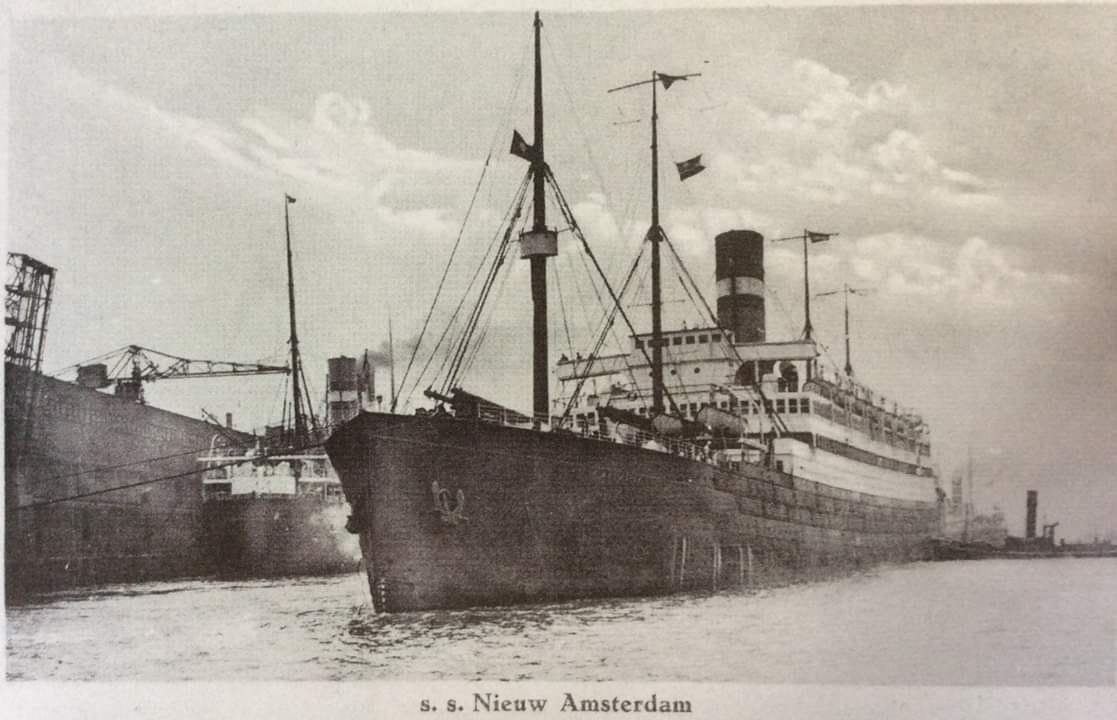
The first ss Nieuw Amsterdam of Holland America. When it came into service in 1906 it was one of the 10 largest ships in the world.
His first ship was the Nieuw Amsterdam (I) which after the Rotterdam (IV) was the most Sr. ship of the fleet. After his cadet ship he rejoined the company and then served on a mixture or cargo and passenger ship. As he went for his First mates ticket in 1917, no doubt given in by the fact that the company was laying more and more ship up, due to the unlimited U-Boat war. When the returned it was to the Zijldijk a ship which in 1918 escaped the general seizure of all the neutral ships laid up in American ports.
Then he returned to the Nieuw Amsterdam which as the only passenger ship of the company was officially exempt for this seizure as it was needed to keep the passenger transport line open between the Netherlands and the USA and carried on the return voyage large amounts of grains for the Dutch population. Both the Zijldijk and the Nieuw Amsterdam sailed in submarine infested waters but neither was harmed.
With the war finished the economy picks up again and the company prospers. Again he services on a mixture of ships when gaining seniority in every rank. There is a photo album with a number of photos from those days.
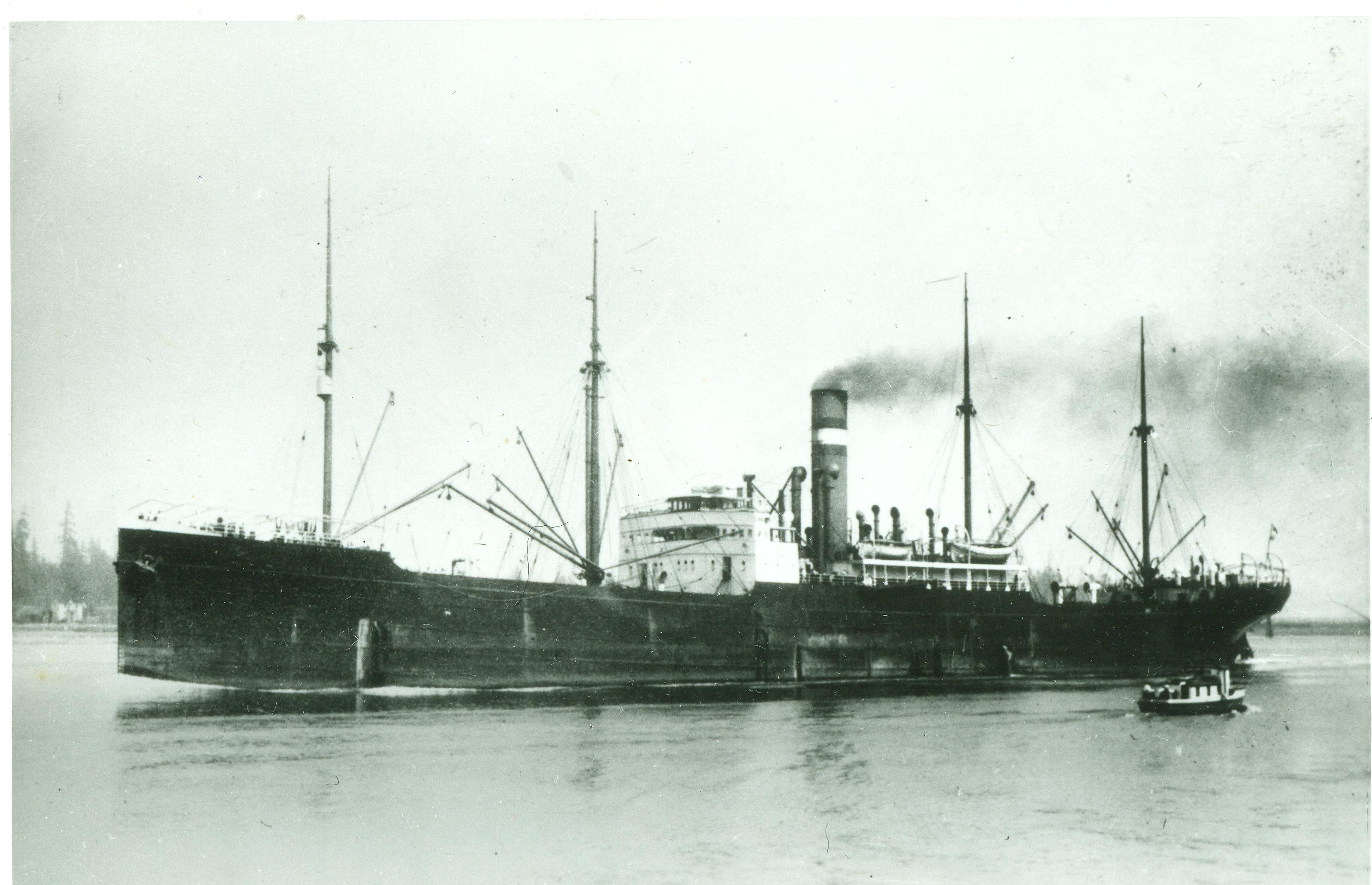
The ss Kinderdijk (I). This ship was assigned to the North Pacific service of the company. which took on average 3 months and was run in conjunction with an English company so a regular (weekly and or bi-weekly) could be maintained. The route went through the Panama Canal and called at middle American Pacific coast ports and continued along USA ports all the way up to Vancouver
I picked two which have some nautical interest, First the pool on board the Kinderdijk in 1922. Until the late 50’s there were no ships with air conditioning and most were designed with black hulls and enclosed superstructures for the cold North Atlantic weather. Thus when a ship sailed in tropical waters all sorts of contraptions where rigged up to bring some relieve. Canvas wind catcher, sleeping under stars, openings cabin doors and portholes from side to side and having a swimming pool. For this a wooden box construction was contrived and a tarpaulin (often from the cargo hatches) was used to make it water tight and then sea water was pumped in and refreshed as necessary. When going to a port the whole construction could be quickly removed and thus not impede the cargo operations.
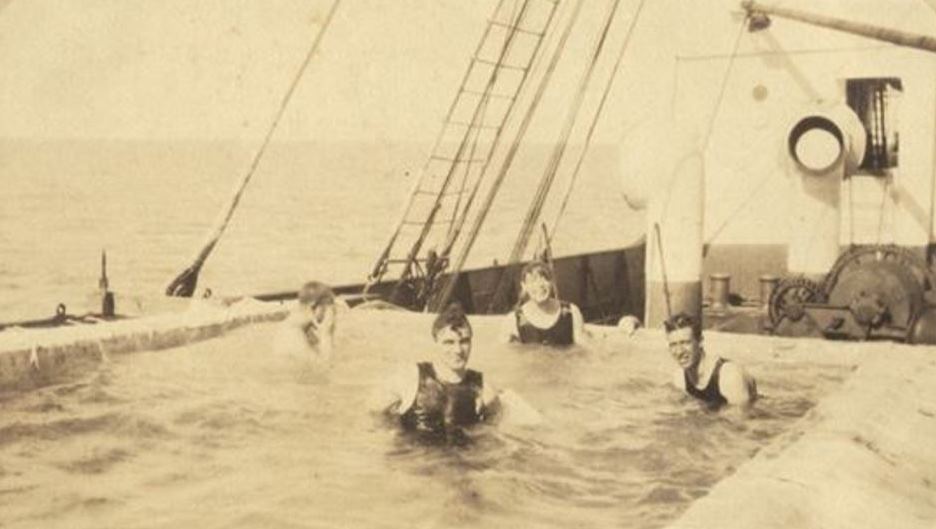
The swimmingpool on the ss Kinderdijk (I) Future Captain Verhoog is on the right hand side.
Secondly tender service. Until the arrival of dedicated cruise ships, or North Atlantic Ocean Liners being assigned especially for cruises, the north Atlantic Liners make cruises “on the side” and thus the ships were not really adapted to providing extra service during their cruise. With visiting ports of the beating track in tropical waters these ships often had to anchor and thus a shuttle or tender service had to be maintained between ship and shore. If no shore side boats could be arrange for, the ships lifeboats were used. These boats were not made to provide any protection against the weather, not comfortable seating, and not easy ways of getting in or out.
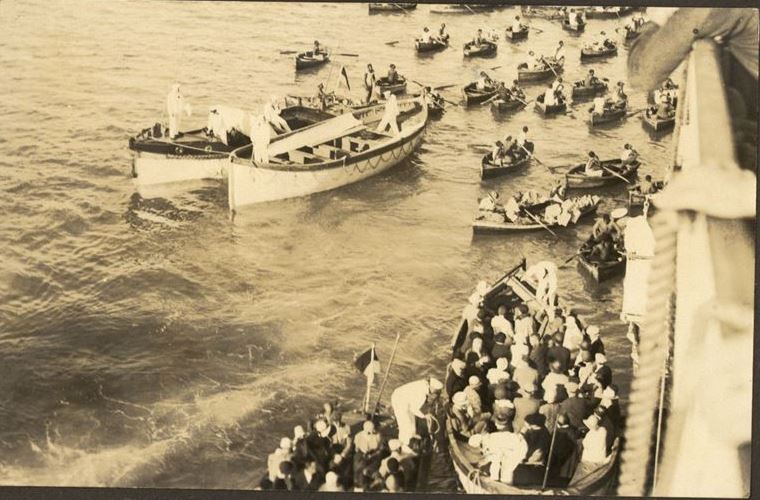
The March 1931 East and West Indies cruise of the ss Statendam (III) Captain in command was Commodore Krol (See his biography elsewhere on the website) Voyage 17d departed on 24 February from New York and called at St. Thomas, Fort de France, St. Pierre (tour drop off), Fort de France, Bridgetown, Brighton, Port of Spain, La Guaira, Wilemstad, Colon, Kingston, Havana , Nassau and New York (arrival 21 March). Here is the ship is at anchor on 3 March off Bridgetown Barbados and the sailors are lining up the lifeboats for loading. These were rowing boats, so boats 1 or 2 (motor boats) would pull the other boats to the shore. Local Boasts were used as well, but most of those in the photo where local souvenir sellers.
By 1929 with the Wall Street crash this changed but by one he was a Sr. Chief Officer with two children and thus he was not laid off but sailed full time. As a result when things improved and the laid up ships returned to service he was promoted to Captain. First acting as captain on the Blommersdijk (I) for a fill in and when that was over as The Sr. Chief Officer of the Fleet to the Flagship the ss Statendam (III). Here he remained until he was given a permanent command, the ss Breedijk. This was one of the 10 B class cargo ships which the company received from the British as compensation for the torpedoing of the ss Statendam (II) in 1917. A company ship which had been under construction in Belfast and had been seized by the British Government and pressed into service as the troopship Justicia.
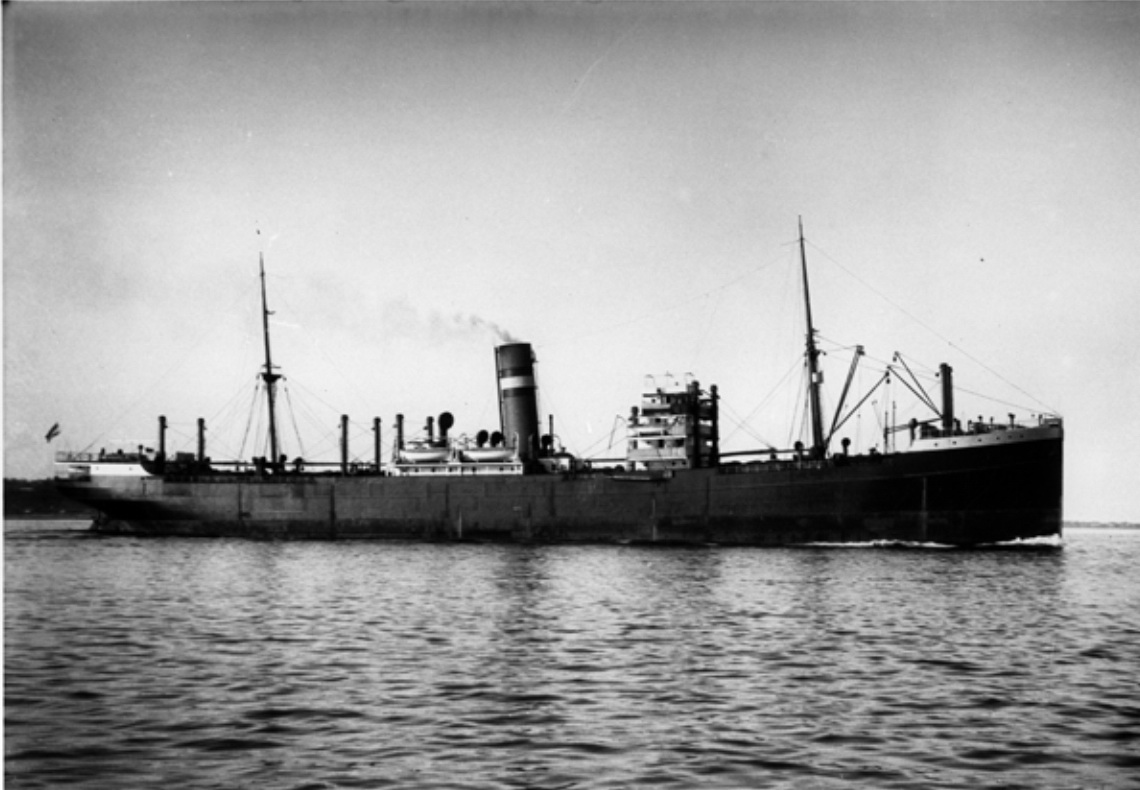
The ss Breedijk. She would not survive the war but was torpedoed on 14 September 1942. Lives were lost including that the captain.
While in command of the Breedijk he notices he first impact of the 2nd world war. As on 08 September 1939 he directs his ship to the rescue of the British tanker Kennebec (1920 Anglo- American oil Co.). This ship had left Aruba and was sailing in the North Atlantic near the Spanish coast and was torpedoed. After an extensive search two lifeboats were located containing 32 crew; a monkey and a few canaries. They were all taken on board and landed in London on 11 Sept. For the few days on board, each rank shared the cabin of his opposite Dutch colleague and the rest was put up in the mess room, day room and some other cabins (Although this was limited as some of those were occupied as there were 7 passengers on board)
He was at home during the war as he was between ships when the invasion started. He was paid by the company throughout the war on “standby money or tariff”.
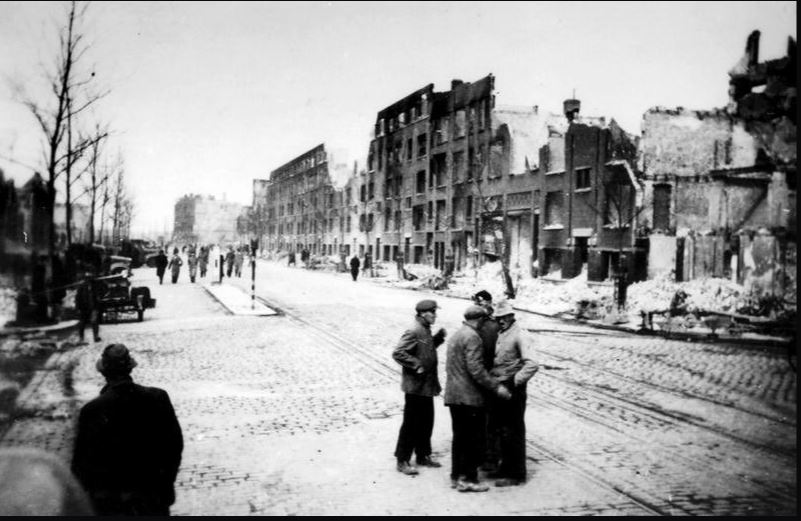
The Schiedamsche Weg in Rotterdam West, after some of the rubble of the bombardment had had been cleared away. After the war all the ruins were removed and new houses built on this location. (c)
On 31 March 1943 his house at the Schiedamseweg in Rotterdam was bombarded and burnt out and so he lost his library and all the house contents. This bombardment by American bombers was meant to destroy the port installations of the port of Rotterdam but due to the very strong westerly wind blowing, all the bombs missed their target and landed on top of streets with houses. Approx. 13,000 people were made homeless and there were at least 326 casualties. (Source: Wikepdia).
Once the war is finished he returns to sea in Jan. 1946 as Captain of the ss Blommersdijk (II) which was a Liberty Ship (and the only one ever to sail for the company) which had been taken over as Army surplus. From that moment onwards his seniority kicks in and he is quickly assigned to the senior ships, ending up in 1952 as Commodore on the flagship of the company the ss Nieuw Amsterdam (II)
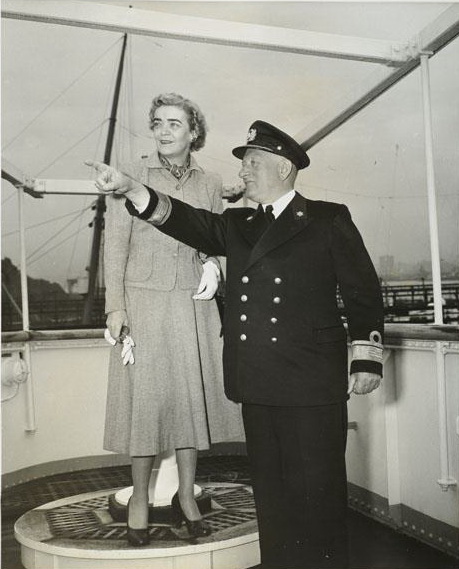
One of the obligatory photo shoots which come with the function of being a senior passenger ship Captain. This is on the starboard bridge wing of the ss Nieuw Amsterdam (II) in New York. it looks like it as if the Lady needs directions to the local bus top before getting off the ship.
He retired on 01 May 1953 from the company. Upon retirement he received a coromandel wooden box with inside his Commodore flag. On the outside the date of joining Hal and the date of retirement. He also received the recognition of Officer in the Order of Orange Nassau, the equivalent of the British KBE.
He then returns for a voyage on the Aardyk in 1954. Some of his colleagues such as ex Commodore Vlietstra did the same. The consensus is (although never confirmed by company or themselves) that they needed the money
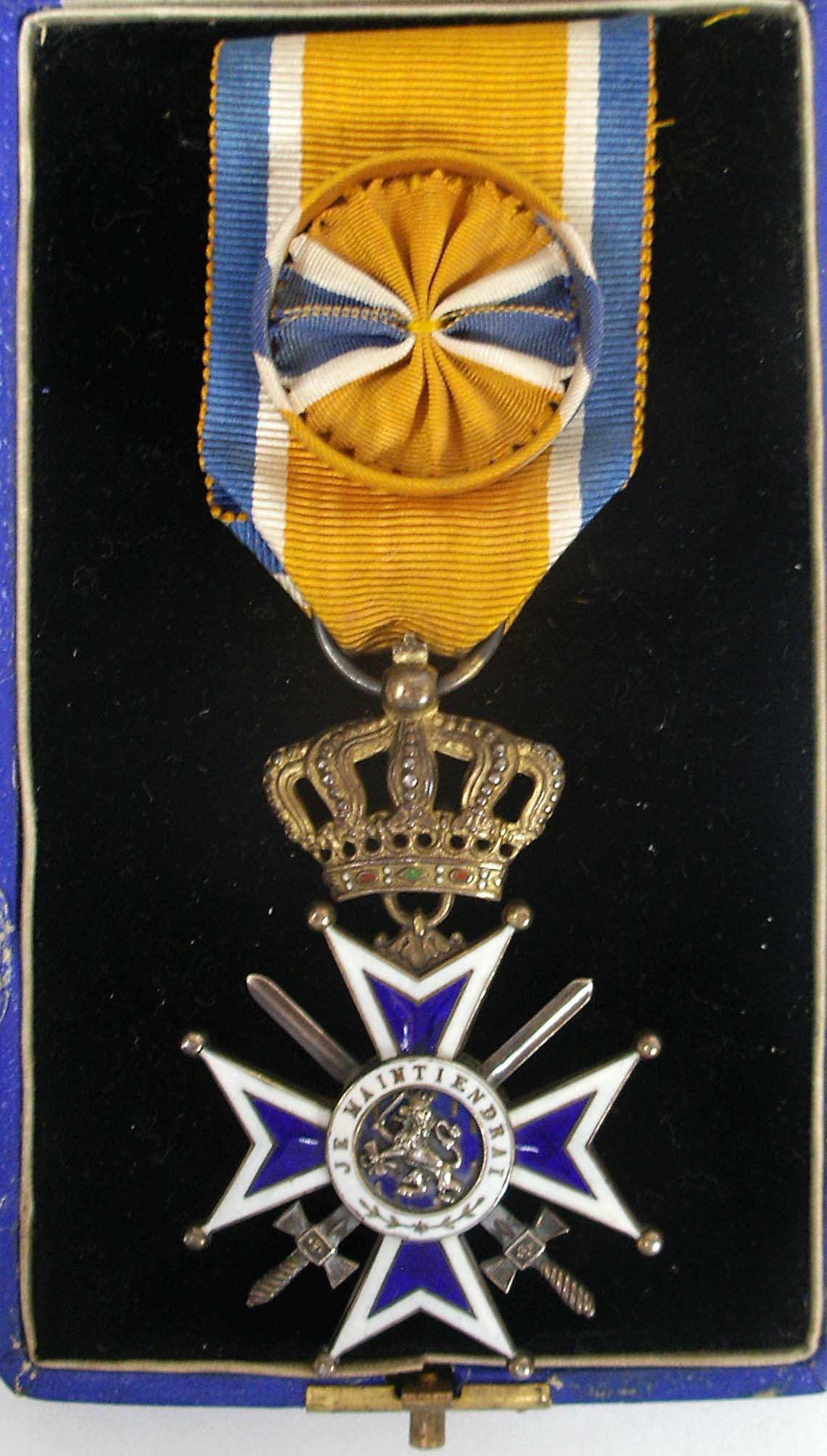
The Dutch Order of Officer in the Order of Oranje – Nassau.
as the pensions were very low especially those who had not sailed during the war years.
Upon his retirement as commodore of the company, he was made an Officer in the Order of Oranje Nassau. (This is a Dutch version of the British OBE)
After retirement he was the chairman of the old boys association of his old Maritime Academy in Amsterdam, (Vereeniging van Oud Kweekelingen VOK) and was later made a Honorary Member (1978)
He passed away on 16 May 1984 after a long illness. A large number of his papers were donated to Georgetown University including many of his manuscripts both in print and hand written. (e)
Last address: Quarles van Uffordstraat 99, 2202 NE Noordwijk
ED: I am still digging for interesting items out of his career by cross referencing the histories of the ships. Also I have not find out what he did during the war years as some Captains, or future captains were not exactly “inactive”. TBA.
(a) What was very special about Captain Verhoog was his hobby. He is credited with a large number of publications, all somehow related to the sea, but varying from Plays, to books, to scientific publications.
One of the captain’s hobby’s was the life of Christopher Columbus and he had figured out that the most likely place where Columbus had made his landfall in the new world were the Caicos Islands. There are many theories about were Columbus exactly landed and nobody is completely sure. Most people think it is San Salvador Island in the North East Bahamas but several other islands lay claim to that fame as well. With the current running along the whole eastern boundary of the Bahamas, Columbus could have landed anywhere. He published this in a 66 page booklet, with chart.
However Captain Verhoog came, after investigation of old Spanish sources and subsequent calculations, to the conclusion that it was the Caicos. He announced this accordingly during an interview with the New York Times. This brought the whole gang of “pro Sal Salvador” proponents into action and for a while there was quite a heated discussion going on in the New York Times. Even in the early 90’s magazine articles devoted to this subject mentioned the theory of Captain Verhoog (f). And again there was the underlying current of him not being a “real scientist” but a sailor.
He could be as intimately involved with Columbus as he was proficient in Spanish and later on he also mastered Old Spanish. He was proficient enough to translate a Spanish book published by the Spanish Noble Prize winner Jimenez into the Dutch Language.
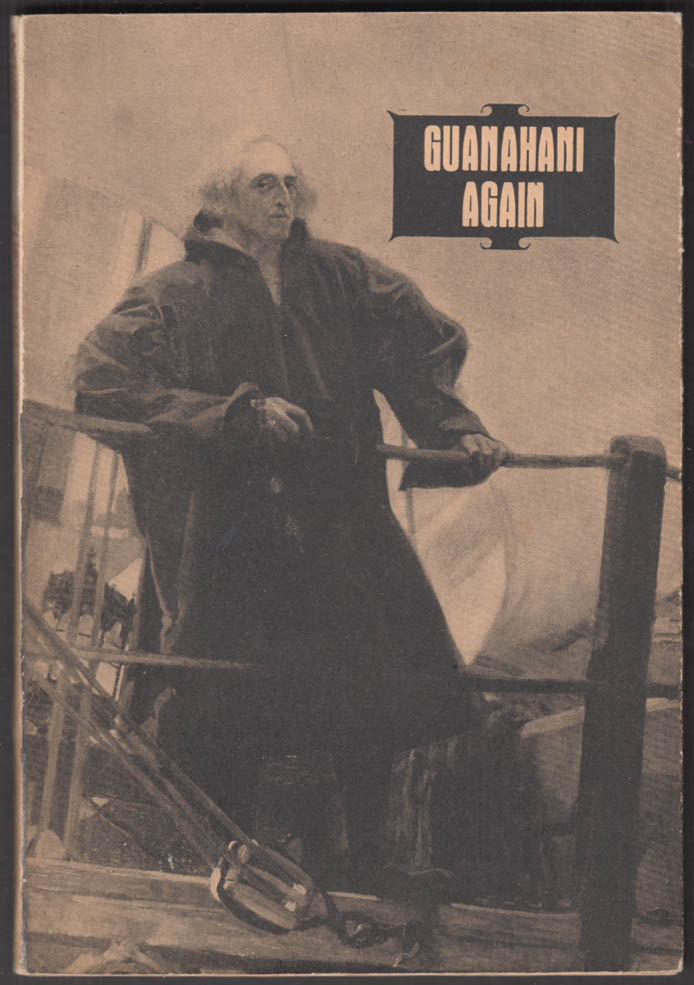
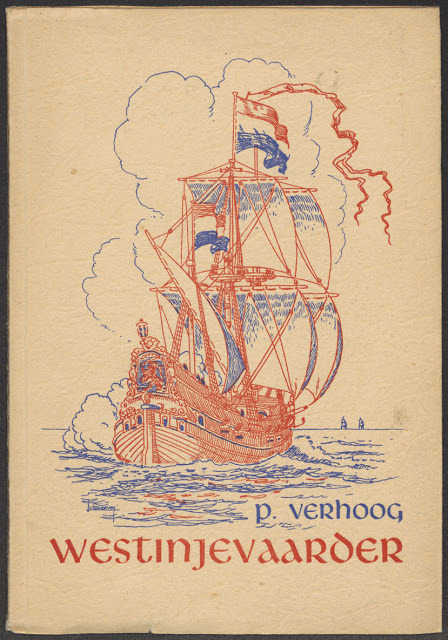
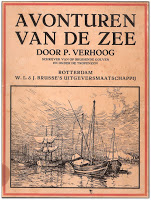
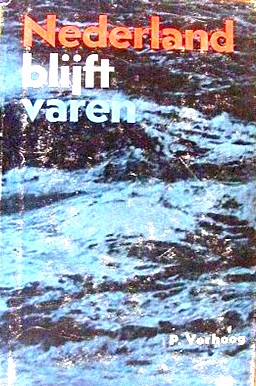 Apart from Columbus he was also very active with other publications: books, plays, a large series of various articles, translations of English books, Poems, Biographies etc. etc. Fiction when not published in book form, many appeared in the local Rotterdam Newspaper, between 1928 and 1940 when he was a regular contributor with the NRC.
Apart from Columbus he was also very active with other publications: books, plays, a large series of various articles, translations of English books, Poems, Biographies etc. etc. Fiction when not published in book form, many appeared in the local Rotterdam Newspaper, between 1928 and 1940 when he was a regular contributor with the NRC.
Nautical articles appeared in professional and hobby magazines alike such as the Dutch “Onze Vloot”, and “Blauwe Wimpel”, but also the esteemed Naval Institute Proceedings.
Photos of some books: small and in line
List of Publications as far as I have been able to find them: (Excluding newspaper and magazine articles)
1924 Op Bruisende Golven, Fiction
1927 Avonturen van de Zee. Fiction
1927 Onder de Tropen Zon een zee verhaal Fiction
1928 Zijn laatste Reis Play
1932 Van Havens en Zeeen Fiction
1933 Schipper Willaert Fiction
1937 Wolken en Water Poetry
1943 Westinjevaarder Fiction
1945 De Vliegende Hollander Fiction
1945 Nederland Blijft Varen Non Fiction
1947 Guanahani again, the Landfall of Columbus in 1492. Scientific
1949 Ontdekker en Admiraal, a biography of Columbus. Scientific
1952 Patero en Ik een Andalusische elegy van J.R Jimenes Translation
1956 Langs Havens en strand; De kust van Belgie en Nederland Non Fiction
1957 Hellevaart Alan Villiers Translation
1958 De ontdekking van amerika voor Columbus Scientific
1959 De Ontwikkeling van onze scheepvaart en havens Non Fiction
1961 De reis van Michel Adriaansz. De Ruyter in 1664 – 1665 Scientific (met L.koelmans)
Xxxx Twee jaar voor de Mast 1834 – 1836 Richard H.Dana Translation
At the very end of this biography I have listed a few of his poems, which by his admirers of the time were considered to be of a very high standards. In they are in the language of his era and have thus not withstood the change of the times. This might also be the reason that his endeavors (apart from the Columbus publication) are not very well remembered anymore.
Even with this considerable output he was not that popular with those who considered themselves experts in literary matters. He was considered an amateur who was either too light, too heavy, to stiff, too common, etc. etc. to find a place in the exalted realms of the Dutch writing community. No doubt the fact that his books sold well (many of his books went for a 2nd or a 3rd print) might not have helped his acceptance in the more eclectic world. I have to assume that for a sailor who stood with both feet firmly on deck he would have been more concerned about his readers than about would the experts thought.
People who sailed with him (F.L. Bertens j.v.i. 1951 cadet Aardyk) remembered that he wrote some articles on board in English and then had those typed out by him, the cadet on board. Then they went by mail to his daughter.
Source Credits:
(a) Commodoreverhoog.blog.spot.com (Including Photo Album)
(b) Voyage information (Stamboeken and movement boeken) from the HAL Archives as held by the Municipal Archives of the City of Rotterdam
(c) Municipal Archives of Rotterdam.
(d) Mr. E.H Kruidhof
(e) Mr. Laurens van der Laan Holland America Historian
(f) Het Parool 04 January page 3 & 16.
(b) Sailing List:
Date: Function: Ship: Wages and/or remarks.
08 Aug. 1910 Cadet Nieuw Amsterdam 10,–
09 Jan. 1911 Cadet Amsteldijk 20,–
02 Sep. 1911 Temporary dismissed to go to school for 3rd mate license passed 28 Oct. 1911
13 Nov. 1911 4th. Officer Potsdam 30,–
11 Oct. 1912 4th. Officer Potsdam 10,–
30 Dec. 1912 3rd officer Gorredijk 60,–
08 Dec. 1913 3rd officer Gorredijk 70,–
14 May.1914 Temporary ashore
23 May.1914 Passed for 2nd mates license
26 May.1914 3rd. officer Noordam 70,–
03 Jul. 1914 3rd officer Noordam 85,–
01 Aug. 1914 Temporary dismissed due to the mobilization service at sea.
04 Oct. 1914 3rd. officer Veendijk 85,–
20 Nov. 1914 2nd officer Veendijk 100,–
15 Mar. 1915 2nd officer Sommelsdijk 100,–
14 Jun. 1915 2nd officer Sommelsdijk 110,–
20 Jan. 1916 2nd officer Noordam 120,–
27 Feb. 1916 Temporary dismissed for military service at sea
13 Oct. 1916 2nd officer Noordam 130,–
26 Apr. 1917 Temporary dismissed to go to school for 1st mates license.
09 May. 1917 Passed for first mates license
08 May.1917 Made available for the military authorities.
28 Jun. 1917 2nd officer Nieuw Amsterdam 130,–
17 Jan. 1918 Temporary shore
11 Feb. 1918 2nd officer Zijldijk 130,–
08 May 1918 2nd officer Sr. Nieuw Amsterdam 130,–
18 Feb. 1919 2nd officer in Rotterdam administration
03 Mar. 1919 2nd officer Sloterdijk 130,–
01 Jul. 1919 wage increase
19 Aug. 1919 2nd officer Rotterdam 215,–
01 Jan. 1920 Wage increase 225,–
01 Jan. 1920 Wage increase 270.–
03 Jul. 1920 Temporary ashore
07 Jul. 1920 Act. Chief Officer Eemdijk 280,–
As acting Chief Officer wage from 01 Jan. 1920 320,–
19 Apr. 1921 Ashore on leave for 25 days,
14 May. 1921 Chief Officer Zaandijk 320,–
19 Oct. 1921 Chief Officer Gorredijk 288,–
26 Jul. 1922 Chief Officer Breedijk 285,–
31 Jan. 1923 Ashore
23 Apr. 1923 Chief Officer Veendijk 285,–
28 May.1924 Chief Officer Grootendijk 285,– At New York
16 Jun. 1924 Ashore 285,–
23 Jul. 1924 Chief Officer Poeldijk 285,–
30 Aug. 1924 Chief Officer Eemdijk 285,–
07 Jul. 1925 Chief Officer Eemdijk 290,– wage increase
22 Mar. 1925 Chief Officer Noordam 290,–
08 Apr. 1926 Chief Officer Blijdendijk 290,–
07 Jul. 1926 Chief Officer Blijdendijk 295,– wage increase
17 Nov. 1926 Chief Officer Leerdam 295,–
01 Apr. 1927 Chief Officer Leerdam 305,– wage increase
01 Jan. 1929 Chief Officer Leerdam 315,–
04 Apr. 1929 Temporary Ashore 315,– Leave.
10 May.1929 Chief Officer Edam 315,-
26 Aug. 1929 Act. Captain Edam 560,–
Due to illness of Capt. Dekker at Havanna.
17 Oct. 1929 Chief Officer Edam 315,–
02 Jan. 1930 Wage increase 325,– starting 1 Jan. 1930
16 Jun. 1930 Chief Officer Maasdam 325,–
18 Dec. 1930 Chief Officer Ashore 325,–
13 Feb. 1931 Chief Officer Grootendijk 325,– with the ship to sea
21 Oct. 1931 Temporary ashore 325,– due to sail Grootendijk
12 Nov. 1931 Wage decrease 262,50
And put on 70% stand by money
09 Jan. 1931 Chief Officer Breedijk 262,50
06 Apr. 1933 Temporary ashore at 70% 262,50 70% canceled
11 Apr. 1933 Chief Officer Leerdam 262,50
28 Jun. 1933 Wage decrease with 5% in acc. with circulaire No 929 dated 27-6-1933
19 Jul. 1933 Chief Officer Bilderdijk 262,50
25 Oct. 1933 Chief Officer Beemsterdijk 263,50
28 Dec. 1933 Wage decrease to 236,25 see circ 929 dated 27-6-1933
30 Dec. 1933 Temporary ashore 236,25
08 Jan. 1934 Chief Officer Breedijk 236,75
20 May. 1934 Chief Officer Breedijk 236,75
22 Sep. 1934 Chief Officer Blommersdijk 236,25
01 Oct. 1934 Wage decrease to 226.75
10 Jan. 1935 Chief Officer Binnendijk 226.75
04 Jul. 1935 Temporary ashore 226.75 regular leave
22 Jul. 1935 Chief Officer Binnendijk 226.75
02 Jan. 1936 Chief Officer Veendam 226.75
04 Nov. 1936 Temporary ashore 226.75 regular leave
12 Nov. 1936 Chief Officer Veendam 226,75
21 Apr. 1936 Temporary ashore 226.75 regular leave
28 Apr. 1936 Act. Captain Blommersdijk 350,– promoted to Act. Captain
01 Oct. 1937 According to new regulation 390,– (as captain)
255.25 as Chief Officer
Captain until 10 Dec.
14 Dec. 1937 Set back to Chief Officer and temp ashore 255,25 regular leave.
GAP
04 Feb. 1939 Chief Officer Statendam
19 Mar. 1939 Chief Officer Statendam
19 Jul. 1939 Captain Breedijk Until 26 Oct. 1939
Note: The Statendam was the Flagship of the company and the function of staff captain / chief officer on board was considered to be on par with being captain. As per company seniority system, the chief officer of the flagship was the first in line to be promoted to Captain when an opening became available. Thus it was possible that somebody went up and down a few times.
Was in the Netherlands during the war, as the ss Statendam (III) did not make it back to sea when the invasion started and subsequently burned out during the fighting in and around the port of Rotterdam.
21 Oct. 1945 Captain Blommersdijk Sailed as passenger to Montreal.
07 Dec. 1945 Captain Blommersdijk Took command in Montreal
03 Jan. 1946 Captain Blommersdijk
Xx Sep. 1946 Captain Groningen/Andyk Until 25 Dec. 1947
travelled to Chester to collect the ship which was then still owned by the Dutch Government. It sailed on 23 October from New York with a cargo of tabacco, and wood (for wooden shoe production) for Antwerp and Rotterdam. In Rotterdam the ship was formally handed over to Holland America and renamed.
28 Jan.1948 Captain Blijdendijk Until 21 Mar. 1948
13 May 1948 Captain Duivendijk Until 20 Dec. 1948
27 Dec. 1948 Captain Noordam Until 09 Oct. 1950
18 Nov. 1950 Captain Westerdam Until 05 Mar. 1951
30 Mar.1951 Captain Veendam Until 22 Oct. 1951
GAP
Most likely on Leave, unless there was a fill in for illness which is not in the records of the company.
Promoted to Commodore date: tba and assigned to the ss Nieuw Amsterdam.
01 Jan. 1952 Captain Nieuw Amsterdam
07 Mar. 1952 Captain Nieuw Amsterdam Until 21 May. 1953
Retired from the company.
Then returns for unknown reasons:
28 Mar. 1954 Captain Aardyk Until 18 May. 1954
20 Aug. 1954 Captain Almdyk Until 07 Nov. 1954
Three Poems published in the Dutch Magazine Forum:
Bui in het Kanaal
De zon een fusaïool van licht
In amethysten wolkenbank,
De kim van zware buien dicht,
Verworgt een doffe donderklank.
Het rhythmisch rillend golfgewemel
Doorschulpt een zeevlak van ophiet,
De violette onweershemel
Bevlaagt blank-adrig het nephriet.
De eb zuigt weg langs Michaëlsbergen,
Ontsnapt de horens van de draak:
De levensmoeden mogen sterven,
Voor ‘t wassend water hen bewaak’.
Sepia vlerken van twee visschers
Bezeilen rotskust in de lij,
Moderne nautische arithmanciërs
Jagen een groote boot voorbij.
Pardoens en stagen zijn het speeltuig,
De sylphenschaar striemt tonen voort,
En dissoneerend, luid en ruig,
Huilt dreigend hun septiemaccoord.
Wit als zwanendons, ijle ijzelwind,
Gamma
Als schuim van de zee, als een gletscher-val.
Blauw de kou van het interstellair heelal,
Getemperd staal, Oceaangolven-tint,
Een aswenteling die op sterven zint.
Geel als vruchten en bloemen in bladerhal,
Als ringen van wespen, als solfer, als gal,
Denkbeeldige grens waar waanzin begint.
Rood: rijpe kersen, vloeiend bloed,
Handeling, prikkeling, roofdiermuil,
Zon achter mist, en vlammengloed.
Zwarte rattenpest, rouw, en smartgehuil,
Aasvliegen op lijken, der mijnen schacht,
En de schuwe schaduwen van de nacht.
Bar in Havana
Spiegelwanden kaatsen flesschen, Rum klutst over kruimels ijs, Beenen slank in zijden kousen, Vreemde vruchten, heete spijs. Neuzig raspt een oude Yankee Na zijn zevende ginfizz, Witte bartenders in actie: Elke greep behendig, wis. Tintelende lichtreclames, Presidente, Daiquiri. Droog tòk-tòk op houten claves: Dreinend schuurt de melodie. Ritselt balslag der maracas, Coïtocentrische muziek: Canciones, tangos, rumbas, Wentelklank van molenwiek Schurkt er als met korte rukjes: Zinbenevelend gekweel. Volk op paddestoelen-krukjes Sipperlipt een rum-cocktail. |
| Buiten rauw claxon-getoeter
In de nauwe, Spaansche straat.
Vreemde geur vol zwoelheid doet er Telkens zinken het gepraat. Bruine facies in de deuren, Meisjes, negers, en een gids, Vicieus verlokkend leuren, Zweemend bieden zondentrits, Wenken klanten in de bar: Elders oesters, rijst ‘con pollo’, Restaurant of lupanar, Nieuw genot, en dans bij banjo. Duister breidt de zee zich uit Langs de gladde Malecon, Rust hergevend ruisch-geluid, Nacht om lichtgloed, abandon. |

June 29, 2020 at 3:10 pm
Thanks so much for the photo of the Breedijk. My late father in law, Hendrik Voorspuy, was a mate on her when she was torpedoed in 1942. He spent a number of days in a life boat off West Africa before being picked up by the British Navy. This is the first photograph I have seen of her. It is an important ship to our family.
Daniel
Staten Island, New York
June 29, 2020 at 8:37 pm
Thank you for visiting my website.
I am working on the history of the Breedijk and it’s captain, Ruygrok (who did not survive the torpedoing)So please check my website again in about six weeks and there should be a lot more information available.
Best regards
Capt. Albert